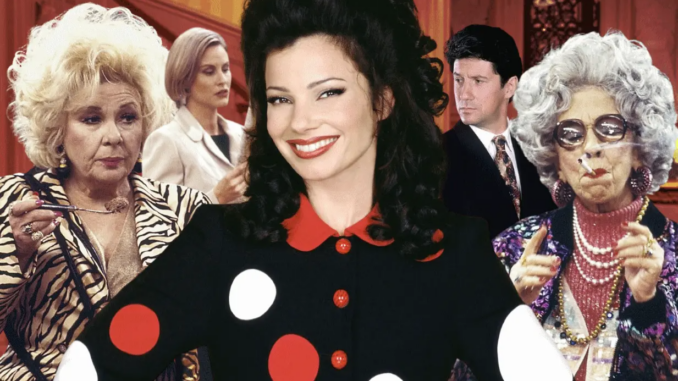
When The Nanny first aired in 1993, it appeared to be just another sitcom—a lighthearted tale of a quirky woman navigating life in an uptight household. But underneath the glitz, glamour, and exaggerated Queens accent, the show had a subversive streak that tackled societal norms, challenged stereotypes, and offered a fresh perspective on family dynamics.
Let’s explore how The Nanny turned convention on its head, delivering a comedic masterpiece that was as bold and unorthodox as Fran Fine’s wardrobe.
Fran Fine: A Feminist in Disguise
A Bold and Unapologetic Character
Fran Fine wasn’t your typical sitcom protagonist. She was brash, confident, and unapologetically herself. At a time when many female characters were subdued or overly polished, Fran’s authenticity made her stand out.
Embracing Sexuality Without Shame
Fran embraced her femininity and sexuality without embarrassment. Her character shattered the stereotype that women had to be demure to be respected.
Family Dynamics Turned Upside Down
A New Kind of Caregiver
Unlike the typical “nanny” trope of strict, Mary Poppins-esque figures, Fran brought warmth, humor, and relatability to the Sheffield household. She wasn’t just a caregiver; she was a friend, mentor, and confidante.
Redefining Parenthood
Fran’s influence on the Sheffield children often overshadowed Maxwell’s formal parenting style. She showed that love, understanding, and relatability were just as important as discipline.
Class Tensions and Cultural Commentary
Queens Meets Manhattan
The juxtaposition of Fran’s working-class Queens background with the Sheffields’ upper-crust Manhattan lifestyle was a goldmine for humor, but it also subtly addressed class disparities.
Breaking Down Stereotypes
Fran’s character proved that intelligence and wisdom weren’t tied to social class or formal education. Her street smarts often saved the day, challenging the audience’s preconceived notions.
Subverting Gender Norms
Fran as the Breadwinner
Despite Maxwell’s wealth, Fran often took charge in unconventional ways. She wasn’t afraid to call the shots, demonstrating her capability and leadership.
Niles and C.C.: A Role Reversal
The dynamic between Niles, the butler, and C.C. Babcock, the career-driven executive, flipped traditional gender roles. Niles’s sharp wit and emotional insights contrasted with C.C.’s stoic ambition, creating a nuanced portrayal of both characters.
Fashion as a Form of Rebellion
Fran’s Iconic Wardrobe
Fran’s bold fashion choices weren’t just about style—they were a statement. Her vibrant outfits defied the subdued elegance expected of women in the Sheffield household, showcasing her individuality and confidence.
Challenging Beauty Standards
Fran’s unapologetic embrace of her looks and personality challenged the era’s narrow beauty standards, empowering viewers to do the same.
Humor as a Weapon
Poking Fun at Privilege
The show’s humor often highlighted the absurdities of wealth and privilege. Fran’s quips about Maxwell’s upper-class cluelessness kept the audience grounded.
Using Comedy to Address Serious Issues
From class struggles to loneliness, The Nanny used humor to explore deeper topics, making them accessible without diminishing their importance.
A Celebration of Found Family
The Bond Between Fran and the Sheffields
Fran’s relationship with the Sheffield family transcended employer-employee dynamics. She became an integral part of their lives, proving that family isn’t always defined by blood.
Nurturing Through Love and Laughter
Fran’s unconventional methods often led to heartfelt moments, reminding viewers that nurturing comes in many forms.
Progressive Themes in “The Nanny”
Acceptance and Inclusivity
The show often celebrated diversity, whether through Fran’s Jewish heritage or her acceptance of different lifestyles and backgrounds.
Tackling Mental Health with Subtlety
Characters like C.C. Babcock offered glimpses into struggles with loneliness and mental health, adding depth to the comedy.
Why “The Nanny” Still Resonates
A Timeless Message of Self-Love
Fran’s confidence and authenticity continue to inspire audiences. Her message? Be yourself, unapologetically.
Comedy That Ages Well
While some elements of the show are tied to the ’90s, its humor and heart remain relatable today.
Lessons from “The Nanny”
1. Authenticity Is Powerful
Fran Fine’s charm lay in her authenticity. She reminded us that staying true to ourselves is the key to success.
2. Humor Can Be Subversive
By using comedy to challenge societal norms, The Nanny showed that laughter can be a powerful tool for change.
3. Family Comes in Many Forms
The Sheffield household proved that love, care, and connection define family more than blood relations.
Conclusion
The Nanny wasn’t just a sitcom—it was a celebration of individuality, a critique of societal norms, and a reminder of the power of love and laughter. Fran Fine’s unapologetic personality and the show’s subversive themes left an indelible mark on television history.
While it had its flaws, The Nanny remains a cherished classic, reminding us that sometimes, the most unexpected characters can teach us the most valuable lessons.
FAQs
1. What made “The Nanny” subversive?
The show challenged societal norms, tackled class disparities, and redefined traditional family dynamics while delivering humor and heart.
2. Was Fran Fine a feminist character?
Yes, Fran Fine’s confidence, individuality, and defiance of stereotypes made her a feminist icon in disguise.
3. How did “The Nanny” address mental health?
The show subtly explored themes of loneliness and emotional struggles, particularly through characters like C.C. Babcock.
4. Why is Fran Fine’s fashion iconic?
Fran’s bold and vibrant wardrobe was a form of self-expression, defying traditional expectations and celebrating individuality.
5. Is “The Nanny” still relevant today?
Absolutely. Its humor, progressive themes, and timeless lessons about authenticity and family continue to resonate with modern audiences.
Now Write An Article On This Topic: The Subversive Pleasures of The Nanny
